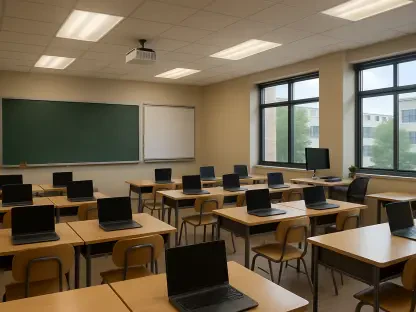In an era of rapid technological advancement, the United Kingdom faces an urgent challenge: bridging the growing digital divide that pervades its schools and colleges. With digital transformation becoming an essential component of modern education, the UK government has recognized the need to address disparities that hinder equitable access to resources. Recent reforms focus on inclusivity and technological enhancement, paving the way for profound changes within the educational landscape. These initiatives encompass various segments, including special needs education, early childcare, and higher education, with new regulatory frameworks and substantial financial investments at the core of their approach.
Addressing the Digital Divide
Government Consultation and Strategic Investment
The focal point of the UK’s digital reform efforts is a comprehensive consultation aimed at narrowing the technological disparities within educational institutions. As part of this initiative, six core digital standards are set to be established by 2030, addressing key areas such as broadband, wireless infrastructure, governance, cybersecurity, and digital leadership. The framework is bolstered by a £45 million investment, earmarked to upgrade wireless networks and complete fiber enhancements at 833 schools. Notably, £25 million is dedicated to wireless network improvements, reflecting an understanding of both current and future connectivity needs. Despite these investments, only 16% of school IT leaders currently report compliance with established standards, underscoring the significant challenges ahead.
Ensuring Equitable Access
Equity in access to technology and resources remains a critical focus for the government as it seeks to ensure all students have similar opportunities for digital engagement. The strategic financial commitment underlines the intention to fortify educational institutions’ connective capabilities, providing students with equitable digital access. Such measures are paramount for inclusive education, allowing students to harness technology for learning irrespective of their socio-economic backgrounds. With ambitious goals in place, these reforms indicate a decisive move toward bridging existing technological gaps, fostering an educational environment tailored for tomorrow’s demands.
Comprehensive Evaluations and Inclusion
Ofsted Ratings System Overhaul
A significant reform that accompanies the technological enhancements is the overhaul of the Ofsted ratings system, beginning in Autumn 2025. Transitioning from the previous four-grade scale, the new system introduces a more nuanced evaluation framework capturing aspects like inclusion, mental health support, and outcomes for students with special educational needs and disabilities (SEND). This shift mirrors broader trends in education that prioritize understanding and supporting diverse challenges faced by students and educators alike. The inclusive evaluation approach aims to alleviate institutional pressures and provide a transparent and fair assessment for parents and stakeholders.
Emphasizing Mental Health and Special Needs
In addressing mental health and SEND, the revamped inspection framework presents a more comprehensive assessment, recognizing the essential role these factors play in educational success. By broadening performance indicators, the overhaul responds to longstanding appeals for a more equitable evaluation process, allowing schools to better reflect their strengths and areas needing improvement. Ultimately, this change represents a robust effort to improve transparency, aid educators, and enhance parental trust in the educational system—providing a fairer and more supportive framework for schools to thrive.
Investment in Inclusive and Early Education
Expanding Special Needs Education
Investment in inclusive education remains a cornerstone of the UK’s reform strategy, demonstrated by the £740 million allocated to creating 10,000 new SEND places. This substantial funding will be instrumental in building new special schools, expanding existing facilities, and enhancing accessibility in mainstream education settings. The government’s commitment addresses increasing demand for specialist provision and ensures high-quality education tailored to individual needs. Additionally, improvements in staff training and infrastructure are set to promote inclusivity, reduce student travel times, and offer them schooling options closer to home.
Strengthening Early Childhood Infrastructure
The UK government extends its reforms into early childhood education, announcing 4,000 additional school-based nursery places by September 2025. With a £37 million investment supporting the first 300 nurseries, efforts are underway to improve early education, especially in regions like the North and Midlands with previously limited access. A focus on expanding school-based nursery provisions is expected to generate substantial parental savings and positively impact children’s educational experiences. By doubling investments in this phase, the government underscores the commitment to fortifying early childhood education, setting a strong foundation for lifelong learning.
Reforming Higher Education Franchises and Subsidy Regulations
Overseeing Franchised Institutions
In 2025, the UK Department for Education launched a consultation targeting the oversight of higher education franchises. Motivated by concerns about student loan fraud and misconduct linked to franchised providers, proposed reforms advocate stricter regulations. Large franchised institutions are to register with the Office for Students, assuring more rigorous monitoring and accountability. Such regulatory changes aim to safeguard public funds and uphold educational standards, indicating potential implementation by spring 2026. Addressing deficiencies in existing oversight, these reforms reflect a proactive stance in maintaining higher education integrity.
Refining Subsidy Control Regime
In a time marked by rapid technological advancement, the United Kingdom faces a pressing issue: bridging the widening digital divide within its educational system. As digital transformation becomes integral to modern education, the UK government acknowledges the necessity of tackling disparities that obstruct fair access to technological resources. Recent reforms have taken aim at inclusivity and technological enhancement, anticipating significant shifts in the educational framework. These efforts cover diverse areas, such as special needs education, early childcare, and higher education. Central to these reforms are new regulatory standards and significant financial investments, both aimed at creating a more equitable educational environment. By integrating technology across all levels of education, the government seeks to equip students with the digital skills necessary for future success, ensuring that no part of the education system falls behind as technology continues to evolve.









